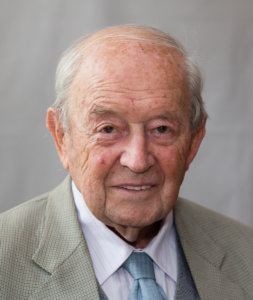Tibor Perceli
After graduating from university, he worked at the Telecommunications Research Institute (TKI), first as a research group leader, then shortly as a department head, and later as a department head. As head of the Microwave Department, he was involved in the theoretical and experimental investigation of microwave nonlinear, active circuits, as well as the research and development of surface wave propagation, parametric effects, noise reduction, and certain telecommunications system engineering issues; with his results, he contributed to the development and production of long-distance, high-capacity microwave radio relay connections.
He began teaching at the Faculty of Electrical Engineering of the Budapest University of Technology (BME) as a part-time assistant professor in 1962. Based on his Doctor of Technical Sciences degree (1965), he worked as an honorary university professor from 1970, and then as a private tutor from 1995.
From 1996, he became a full-time employee of the Department of Microwave Communications (later merged with the Department of Theoretical Electricity under the name of the Department of Broadband Communications and Electrical Engineering (HVT)) of BME as a teacher and researcher. Here, he researched and achieved results in the field of microwave photonics (especially in the field of optical control of microwave amplifiers and oscillators, combined lightwave-microwave phase detection and phase-locked loop optical frequency stabilization).
His taught topics are largely of his own development (Microwave circuits; Microwave active circuits; Optical-microwave circuits and systems; Telecommunications application issues; Optical telecommunications, optical networks and network elements).
He has worked as a domestic leader in several European Union projects. In addition, he participated in two European "Network of Excellence" programs, several COST (European Cooperation in Science and Technology) projects, Hungarian research consortia, and was the leader of 7 OTKA (National Scientific Research Fund) research topics.
He has conducted research or taught for shorter or longer periods at several foreign research institutions: at the Polytechnic Institute of Brooklyn in New York (1964); at University College London (UCL) (1986); as a visiting professor at Drexel University, Philadelphia (1988/89); as a lecturer at the Hamburg University of Technology for one semester (1991); as a visiting professor at Osaka University in Japan and the University of Grenoble in France (1992 and 1994, respectively); as a lecturer at the Helsinki University of Technology in Finland (2001); and then at the University of Sydney in Australia (2004). His research was supported by a Széchenyi Professorship from 2000 for 4 years.
He has reported on his research results in nearly 400 international and domestic publications and conference presentations. He has published 6 books (several of them in English; two on the topic of nonlinear microwave circuits). His inventions are protected by 26 domestic and numerous foreign patents.
For many decades, he has been a member of the Telecommunications Scientific Committee of the Hungarian Academy of Sciences (MTA) and the National Committee of the URSI (International Union of Radio Science).
Since 1960, he has been a member of the Hungarian Telecommunications (later Telecommunications and Informatics) Scientific Association (HTE); he was a member of the board for many years. In 1962, he was an active preparer of the II. Microcoll conference organized by HTE; through his many years of activity, the series, held every four years, became a successful international colloquium.
He is a Life Fellow of the IEEE (Institute of Electrical and Electronics Engineers); a Speakers Bureau member of the IEEE Microwave Theory and Techniques Society; and a member of the EuMA (European Microwave Association) and the OSA (Optical Society of America).
Awards: IEEE Premium Awards (IEEE, London, 1961); Virág–Pollák Award (HTE, 1965); State Award (Hungarian State, 1980); MIKON Award (Microwave and Radiolocation Foundation, Warsaw, 2002); EuMA Distinguished Service Award (EuMA, 2006); Pro Facultate Award (BME, 2012); IEEE Microwave Career Award - Lifetime Achievement Award (2016); Lifetime Achievement Award (HTE, 2024).
Created: 2024.07.04. 23:24
Last modified: 2024.12.16. 10:56

